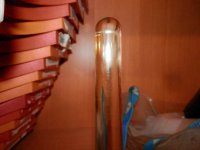I noticed the highest point of the Punto braking system is the master cyclinder feeds 1 and 2 to the ABS unit, followed by the 4 exits from the ABS unit that go to each wheel.
That must mean that sometimes air will diffuse from the lower master cylinder reservoir to the higher and therefore lower pressure ABS pipes. Yes the pipes are under a huge pressure sometimes. But I am not sure what actually will happen.
I found an informed motor bike thread saying you can remove air by tying down the brake lever overnight. It was suggested this works because the air can escape thru the rubber hoses or connections which allow high pressure air to escape but do not allow liquid to escape.
I was wondering if you could get a harder brake by adding two bleedable valves to the highest point of the system. Or does the clean new hydroscopic fluid tend to dissolve a small amount of air anyway even over a year or more?
On the other hand its something else to go wrong and hardly worth bothering about!
But even so I just ordered a spare master cylinder and ABS unit from the scrap yard to get totally obsessive compulsive about it and see if i can find out if air does migrate there naturally with new fluid.


 :idea:
:idea:
That must mean that sometimes air will diffuse from the lower master cylinder reservoir to the higher and therefore lower pressure ABS pipes. Yes the pipes are under a huge pressure sometimes. But I am not sure what actually will happen.
I found an informed motor bike thread saying you can remove air by tying down the brake lever overnight. It was suggested this works because the air can escape thru the rubber hoses or connections which allow high pressure air to escape but do not allow liquid to escape.
I was wondering if you could get a harder brake by adding two bleedable valves to the highest point of the system. Or does the clean new hydroscopic fluid tend to dissolve a small amount of air anyway even over a year or more?
On the other hand its something else to go wrong and hardly worth bothering about!
But even so I just ordered a spare master cylinder and ABS unit from the scrap yard to get totally obsessive compulsive about it and see if i can find out if air does migrate there naturally with new fluid.



